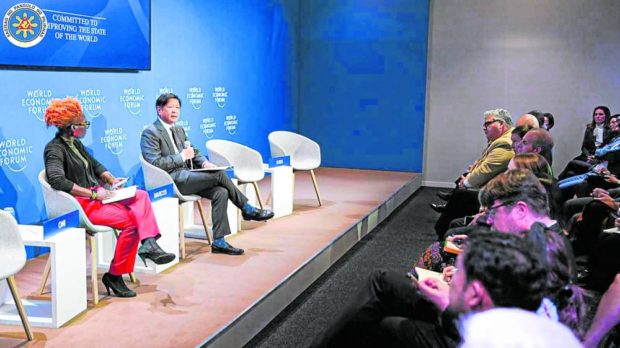Marcos vows to work hard, do well as president

FOOD SECURITY TALK President Ferdinand “Bongbong” Marcos Jr. calls for systems-based and data-driven cooperation to achieve food security at the “Moving Towards Nutrition Security” program of the World Economic Forum in Davos, Switzerland. In his speech, Marcos recommended boosting production, investing in infrastructure, logistics and systems to improve food access, and encouraging a healthy lifestyle, according to the Palace. —MALACAÑANG PHOTO
DAVOS — He never expected to enter politics, much less to be president. But he reckoned it was necessary for the survival of his family.
And now that he has been elected CEO of the Philippines for six years, President Ferdinand “Bongbong” Marcos Jr. vowed to a global audience that he would “work hard” and “do it well.”
Bringing back to the pinnacle of power a dynasty that was ousted by the 1986 EDSA Revolution, the son of ousted dictator Ferdinand Marcos — who died in exile in Hawaii in 1989 — said he needed to explain his journey to the presidency.
Going into politics, he said during a dialogue with World Economic Forum (WEF) president Borge Brende, was necessary not just to protect the “legacy” of his father but to ensure the survival of the Marcos family.
After his studies abroad, Marcos recalled that he was determined not to go into politics.
Article continues after this advertisement“My father had done everything in politics and the life was difficult and I could see the sacrifices that they had to make, that he had to make, to get to do a good job and I said, maybe that’s not what I’m meant to be doing,” said Marcos.
Article continues after this advertisement“If you were to ask when I was 23, 24, 25 years old, will you enter the politics? Before you finish asking the question, I’ve already said no, no, no, no. But you know, life takes you to certain places that you did not expect,” he said.
In September 1972, with a little over a year left before the end of his second and last term as president, Marcos Sr. declared martial law, muffled the press, ordered the arrest of his political opponents and suspected communists, padlocked Congress and ruled by decree until he was toppled 14 years later.
He and his family and close associates fled into exile to Hawaii, aided by the US government.
In 1991 when his family was allowed to return to the Philippines, the President said the Marcos name was still a “political issue.” His father’s stigma of plundering billions of dollars continued to hound the next generation.
“For us to defend ourselves politically, somebody had to enter politics and be in the political arena so that at least, not only the legacy of my father but even our own survival required that somebody go into politics,” the President said.
He won a congressional seat representing his home province of Ilocos Norte in the 1992 elections.
“And so once I was entrenched in the political arena, I said, well — if we’re going to do this, you better do it well,” he said.
“Every lieutenant wants to be a general, right? Every clerk wants to be the CEO,” he said. “So, I’m saying if I’m going to be in politics, let’s do the best we can and take it as far as we can take it. So, we just never stop. But you know, this is your career now, so work hard at it and do it well. Do it the best that you can.”
In last year’s elections, 31 million votes won him the presidency, representing 56 percent of ballots cast. An alliance with the still-popular Duterte dynasty paved the road to his victory.
Looking back, Marcos said he never expected to become president.
“We were in exile for six years so we weren’t sure if we were coming back at all, physically coming back. My father never made it back. He died in Hawaii. So that was a very trying time, those were dark days for the family, and I dare say, even for the country,” he said.